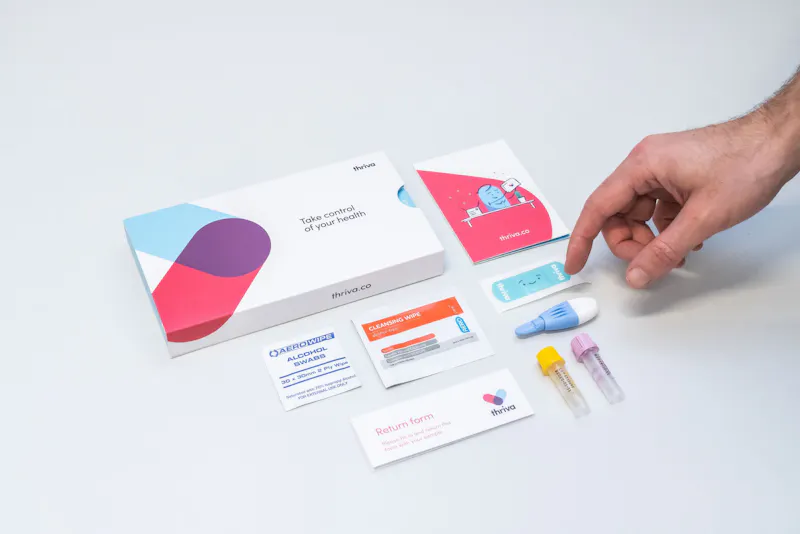What is HbA1c and how do you test it?
What's covered?



HbA1c refers to glycated haemoglobin — the amount of glucose (sugar) that's attached to haemoglobin (an oxygen-carrying protein found in red blood cells). It's sometimes called haemoglobin A1c or just A1c. An HbA1c blood test can check your average blood sugar control over the past 3 months. A normal HbA1c level is below 42 mmol/mol. Checking your HbA1c regularly can help indicate your risk of developing diabetes. A healthy lifestyle can help lower raised HbA1c levels.
What is an HbA1c test?
When the sugar in your blood rises, it binds to haemoglobin in your red blood cells. And because your red blood cells live for about 2 to 3 months, an HbA1c blood test can tell your average blood glucose (sugar) control over the last 3 months. This helps indicate your pre-diabetes and diabetes risk.
You can check your blood sugar control at home by using an HbA1c blood test. You can do this test at any time of day, and you don’t need to fast beforehand.
If your HbA1c result is high, you should check your levels every 3 to 6 months.
Is an HbA1c test suitable for everyone?
An HbA1c test won’t tell you how high your blood sugar is. It also doesn’t capture the hourly and daily changes in your blood sugar levels. But it can tell you if your blood sugar has been high for prolonged periods over the last 3 months. Some conditions can cause fluctuations in your HbA1c levels.
A doctor won't use a single HbA1c result to diagnose diabetes. And there are situations where HbA1c shouldn’t be used to diagnose diabetes. This includes if you:
- are pregnant or gave birth in the last 2 months
- have only been experiencing diabetes symptoms for 2 months — like frequent urination or excessive thirst
- take medication that can affect your blood sugar levels — like long-term steroid treatment and some antibiotics
- are currently acutely ill (a sudden and severe sickness)
- have pancreatic problems
- have end-stage kidney disease
- are HIV positive
If you have one of these conditions, it's better to speak with your GP, who'll most likely organise an oral glucose tolerance test instead. This test checks your glucose levels after you've fasted (not eaten) for 8 hours and then after you've had a sugary drink — this shows how well your body handles glucose.
Some health conditions can make it more difficult to interpret your HbA1c results — for example, if you've had a recent blood transfusion.
What's a normal HbA1c level?
The ranges for HbA1c levels are defined as:
- normal range = below 42 mmol/mol
- prediabetes = 42-47 mmol/mol
- indicates diabetes = 48 mmol/mol or over
If you already have diabetes, your target range might differ and be tailored to things like your age and whether you have any other health conditions. Your GP can help you understand what’s considered a normal HbA1c level for you.
What does a high HbA1c level mean?
An HbA1c test can help indicate your risk of developing pre-diabetes and type 2 diabetes — if you don't have any condition that might affect your results. Or, if you have diabetes, an HbA1c test is a useful way to check how well you're controlling your blood sugar levels.
Symptoms of high HbA1c levels
If your HbA1c result indicates pre-diabetes, you'll unlikely have any symptoms. But if your HbA1c level indicates diabetes, some common symptoms include:
- excessive thirst (polydipsia)
- frequent urination (polyuria)
- tiredness
- blurred vision
- unexplained weight loss
If you have any of these symptoms, you should see your doctor.
It’s important to note that symptoms can differ from person to person, and some might be mild or absent.
Long-term, high HbA1c results associated with diabetes might lead to eye problems, kidney disease, heart disease, stroke, and erectile dysfunction.
What can cause a high HbA1c level?
Many things can cause high blood sugar levels and subsequently high HbA1c levels.
These include:
- being overweight
- an unhealthy diet
- lack of exercise
- chronic stress
- some medications — for example, steroids
- diabetes
How to lower your HbA1c level
There are lots of ways to lower your HbA1c levels, including:
- exercising regularly — always speak to your doctor first before increasing intensity or trying new activities if you have any medical conditions
- losing weight if you’re overweight
- quitting smoking — this helps your blood travel more easily around your body
- eating fibre-rich foods with a low glycaemic index (GI) — like whole grains, pulses, beans, porridge, muesli, fruit, and vegetables
- avoiding processed foods high in trans and saturated fats and sugar
British Dietetic Association (2020). Glycaemic index (GI): Food fact sheet. Retrieved 8 September 2022 from https://www.bda.uk.com/resource/glycaemic-index.html.
Diabetes UK (2022). What is HbA1c? Retrieved 8 September 2022 from https://www.diabetes.org.uk/guide-to-diabetes/managing-your-diabetes/hba1c.
National Health Services (2022). High blood sugar (hyperglycaemia). Retrieved 8 September 2022 from https://www.nhs.uk/conditions/high-blood-sugar-hyperglycaemia/.
National Health Services (2019). Paediatric Diabetes High HbA1c. Retrieved 8 September 2022 from https://www.uhcw.nhs.uk/download/clientfiles/files/Patient%20Information%20Leaflets/Women%20and%20Children_s/Paediatrics/Paediatric%20Diabetes/119800_Paediatric_Diabetes_-_High_HbA1c.doc_(1838).pdf.
National Health Services (2022). Type 2 diabetes: Getting diagnosed. Retrieved 8 September 2022 from https://www.nhs.uk/conditions/type-2-diabetes/getting-diagnosed/.
NICE (2022). When should I suspect type 2 diabetes in an adult? Retrieved 8 September 2022 from https://cks.nice.org.uk/topics/diabetes-type-2/diagnosis/diagnosis-in-adults/.
WHO (2011). Use of Glycated Haemoglobin (HbA1c) in the Diagnosis of Diabetes Mellitus. Retrieved 8 September 2022 from https://apps.who.int/iris/bitstream/handle/10665/70523/WHO_NMH_CHP_CPM_11.1_eng.pdf.